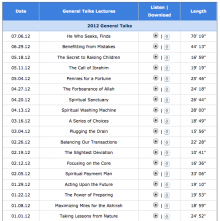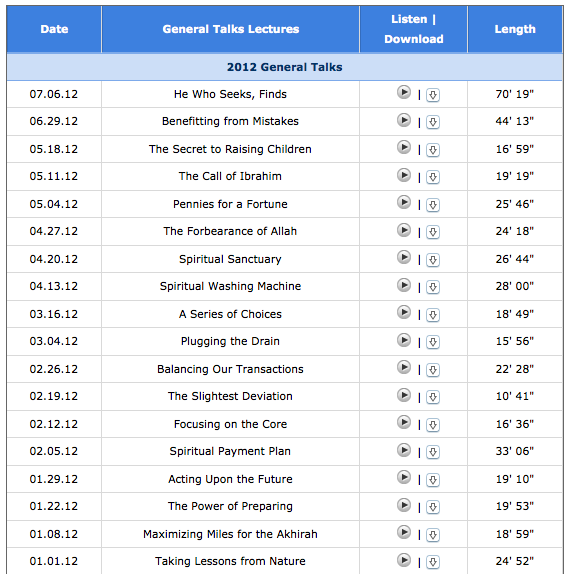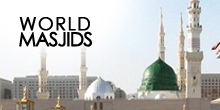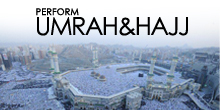Written by oneloveIslamPosted in Daily IslamTags: 1 LOVE ISLAM, akhira, allah, allahu akbar, arafah, ayaah, azaan, BEARD, believers, Bismillah, blessings, BROTHERHOOD, bukhari, call for prayer, Charity, creator, dawah, DAY OF JUDGEMENT, death, deeds, deen, dhikr, DU'A, forgivness, friday, guidance, hadith, hajj, HALAL, hearafter, heart, help, HOLY QURAN, I BEAR WITNESS, IQRA, islam, jannah, JESUS, jumma, kaaba, laillaha ilallah, last messenger, life, madinah, makkah, masjid, mecca, mohammed, muhammed, muslim, ONE ALLAH, ONE LOVE ISLAM, peace be upon him, prayer, prophet, QURAN, REMEMBERANCE, SALAH, SLAVE, Soul, sunnah, surah, Surah Kahf, tafseer, ummah, world, YA ALLAH, zakat, اللهAugust 6, 2012
Are you not aware that Allah knows whatever is in the heavens and
whatever is in the earth? Never is there any whispering among three but He is
their fourth; nor among five but He is their sixth; nor fewer nor more but He is
with them wherever they may be. And then He will tell them on the Day of
Judgement all that they have done. Surely Allah knows everything.
Written by oneloveIslamPosted in Daily IslamTags: 1 LOVE ISLAM, akhira, allah, allahu akbar, arafah, ayaah, azaan, BEARD, believers, Bismillah, blessings, BROTHERHOOD, bukhari, call for prayer, Charity, creator, dawah, DAY OF JUDGEMENT, death, deeds, deen, dhikr, DU'A, forgivness, friday, guidance, hadith, hajj, HALAL, hearafter, heart, help, HOLY QURAN, I BEAR WITNESS, IQRA, islam, jannah, JESUS, jumma, kaaba, laillaha ilallah, last messenger, life, madinah, makkah, masjid, mecca, mohammed, muhammed, muslim, ONE ALLAH, ONE LOVE ISLAM, peace be upon him, prayer, prophet, QURAN, REMEMBERANCE, SALAH, SLAVE, Soul, sunnah, surah, Surah Kahf, tafseer, ummah, world, YA ALLAH, zakat, اللهAugust 6, 2012
Written by oneloveIslamPosted in Daily Islam,QuranTags: 1 LOVE ISLAM, akhira, allah, allahu akbar, arafah, ayaah, azaan, BEARD, believers, Bismillah, blessings, BROTHERHOOD, bukhari, call for prayer, Charity, creator, dawah, DAY OF JUDGEMENT, death, deeds, deen, dhikr, DU'A, forgivness, friday, guidance, hadith, hajj, HALAL, hearafter, heart, help, HOLY QURAN, I BEAR WITNESS, IQRA, islam, jannah, JESUS, jumma, kaaba, laillaha ilallah, last messenger, life, madinah, makkah, masjid, mecca, mohammed, muhammed, muslim, ONE ALLAH, ONE LOVE ISLAM, peace be upon him, prayer, prophet, QURAN, REMEMBERANCE, SALAH, SLAVE, Soul, sunnah, surah, Surah Kahf, tafseer, ummah, world, YA ALLAH, zakat, اللهAugust 6, 2012
Say: I seek refuge in the Lord of men,
The King of men,
The god of men,
From the evil of the whisperings of the slinking (Shaitan),
Who whispers into the hearts of men,
From among the Jinn and the men.
Written by oneloveIslamPosted in Daily Islam,QuranTags: 1 LOVE ISLAM, akhira, allah, allahu akbar, arafah, ayaah, azaan, BEARD, believers, Bismillah, blessings, BROTHERHOOD, bukhari, call for prayer, Charity, creator, dawah, DAY OF JUDGEMENT, death, deeds, deen, dhikr, DU'A, forgivness, friday, guidance, hadith, hajj, HALAL, hearafter, heart, help, HOLY QURAN, I BEAR WITNESS, IQRA, islam, jannah, JESUS, jumma, kaaba, laillaha ilallah, last messenger, life, madinah, makkah, masjid, mecca, mohammed, muhammed, muslim, ONE ALLAH, ONE LOVE ISLAM, peace be upon him, prayer, prophet, QURAN, REMEMBERANCE, SALAH, SLAVE, Soul, sunnah, surah, Surah Kahf, tafseer, ummah, world, YA ALLAH, zakat, اللهAugust 3, 2012

 And do not pursue that of which you have no knowledge. Indeed, the hearing, the sight and the heart – about all those [one] will be questioned.(17:36)
And do not pursue that of which you have no knowledge. Indeed, the hearing, the sight and the heart – about all those [one] will be questioned.(17:36)
Written by oneloveIslamPosted in Daily Islam,QuranTags: 1 LOVE ISLAM, akhira, allah, allahu akbar, arafah, ayaah, azaan, BEARD, believers, Bismillah, blessings, BROTHERHOOD, bukhari, call for prayer, Charity, creator, dawah, DAY OF JUDGEMENT, death, deeds, deen, dhikr, DU'A, forgivness, friday, guidance, hadith, hajj, HALAL, hearafter, heart, help, HOLY QURAN, I BEAR WITNESS, IQRA, islam, jannah, JESUS, jumma, kaaba, laillaha ilallah, last messenger, life, madinah, makkah, masjid, mecca, mohammed, muhammed, muslim, ONE ALLAH, ONE LOVE ISLAM, peace be upon him, prayer, prophet, QURAN, REMEMBERANCE, SALAH, SLAVE, Soul, sunnah, surah, Surah Kahf, tafseer, ummah, world, YA ALLAH, zakat, اللهAugust 3, 2012
Written by oneloveIslamPosted in Daily Islam,HadithTags: 1 LOVE ISLAM, akhira, allah, allahu akbar, arafah, ayaah, azaan, BEARD, believers, Bismillah, blessings, BROTHERHOOD, bukhari, call for prayer, Charity, creator, dawah, DAY OF JUDGEMENT, death, deeds, deen, dhikr, DU'A, forgivness, friday, guidance, hadith, hajj, HALAL, hearafter, heart, help, HOLY QURAN, I BEAR WITNESS, IQRA, islam, jannah, JESUS, jumma, kaaba, laillaha ilallah, last messenger, life, madinah, makkah, masjid, mecca, mohammed, muhammed, muslim, ONE ALLAH, ONE LOVE ISLAM, peace be upon him, prayer, prophet, QURAN, REMEMBERANCE, SALAH, SLAVE, Soul, sunnah, surah, Surah Kahf, tafseer, ummah, world, YA ALLAH, zakat, اللهAugust 3, 2012
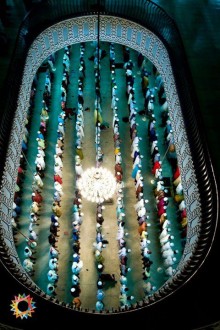
Abu Hurairah {R.A} reports that Nabi {S.A.W} in a Hadith Qudsi narrated that Allah Ta’ala says: I treat My slave according to his expectations from Me. I am with him when he remembers Me; and if he remembers Me in his heart, I remember him in My Heart; and if he remembers Me in a gathering, I remember him in a better and nobler gathering [of Angels]. If he comes closer to Me by one span, I go closer to him an arm’s length; if he come towards Me an arm’s length; I go toward him two arm’s length; and if he come to Me walking I run to him.
{Bukhari}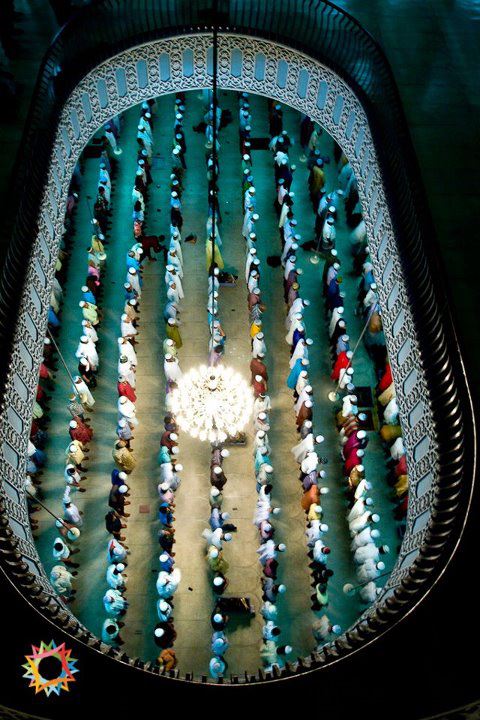 PHOTO CREDIT capturethespiritoframadan.org
PHOTO CREDIT capturethespiritoframadan.org
Written by oneloveIslamPosted in Daily Islam,HadithTags: 1 LOVE ISLAM, akhira, allah, allahu akbar, arafah, ayaah, azaan, BEARD, believers, Bismillah, blessings, BROTHERHOOD, bukhari, call for prayer, Charity, creator, dawah, DAY OF JUDGEMENT, death, deeds, deen, dhikr, DU'A, forgivness, friday, guidance, hadith, hajj, HALAL, hearafter, heart, help, HOLY QURAN, I BEAR WITNESS, IQRA, islam, jannah, JESUS, jumma, kaaba, laillaha ilallah, last messenger, life, madinah, makkah, masjid, mecca, mohammed, muhammed, muslim, ONE ALLAH, ONE LOVE ISLAM, peace be upon him, prayer, prophet, QURAN, REMEMBERANCE, SALAH, SLAVE, Soul, sunnah, surah, Surah Kahf, tafseer, ummah, world, YA ALLAH, zakat, اللهAugust 2, 2012
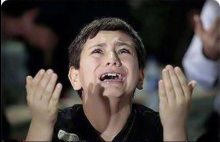
The Prophet [S.A.W] said:
The tears that fall from the eyes of a truthful believer, out of the fear of Allah The Most Merciful, and then roll down his face, however little they are, even (though they be) of the size of the head of a fly, shall prevent the Fire of Hell from touching his face.” [Ibn Majah].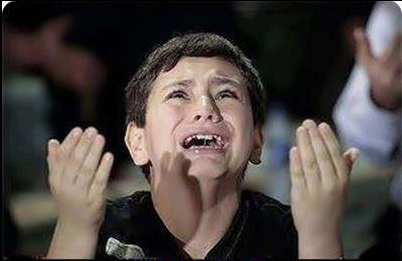
Written by oneloveIslamPosted in Daily Islam,HadithTags: 1 LOVE ISLAM, akhira, allah, allahu akbar, arafah, ayaah, azaan, BEARD, believers, Bismillah, blessings, BROTHERHOOD, bukhari, call for prayer, Charity, creator, dawah, DAY OF JUDGEMENT, death, deeds, deen, dhikr, DU'A, forgivness, friday, guidance, hadith, hajj, HALAL, hearafter, heart, help, HOLY QURAN, I BEAR WITNESS, IQRA, islam, jannah, JESUS, jumma, kaaba, laillaha ilallah, last messenger, life, madinah, makkah, masjid, mecca, mohammed, muhammed, muslim, ONE ALLAH, ONE LOVE ISLAM, peace be upon him, prayer, prophet, QURAN, REMEMBERANCE, SALAH, SLAVE, Soul, sunnah, surah, Surah Kahf, tafseer, ummah, world, YA ALLAH, zakat, اللهAugust 2, 2012
The Prophet (Sallallähu alaihi wa sallam) Said, “There are three solid truths:
1. If a person is wronged and he forbears it (without seeking revenge) just for the sake of Allah (SWT), Allah will honour him and give him the upper hand with His help;
2. If a person opens a door of giving gifts for cementing relationships with relatives, Allah will give him abundance;
3. If a person opens a door of seeking charity for himself to increase his wealth, Allah will further reduce his wealth.’
(Reported from Aboo Hurairah inMishkaah and Musnad Ahmad).
Written by oneloveIslamPosted in Daily Islam,HadithTags: 1 LOVE ISLAM, akhira, allah, allahu akbar, arafah, ayaah, azaan, BEARD, believers, Bismillah, blessings, BROTHERHOOD, bukhari, call for prayer, Charity, creator, dawah, DAY OF JUDGEMENT, death, deeds, deen, dhikr, DU'A, forgivness, friday, guidance, hadith, hajj, HALAL, hearafter, heart, help, HOLY QURAN, I BEAR WITNESS, IQRA, islam, jannah, JESUS, jumma, kaaba, laillaha ilallah, last messenger, life, madinah, makkah, masjid, mecca, mohammed, muhammed, muslim, ONE ALLAH, ONE LOVE ISLAM, peace be upon him, prayer, prophet, QURAN, REMEMBERANCE, SALAH, SLAVE, Soul, sunnah, surah, Surah Kahf, tafseer, ummah, world, YA ALLAH, zakat, اللهAugust 1, 2012
Written by oneloveIslamPosted in Daily IslamTags: 1 LOVE ISLAM, akhira, allah, allahu akbar, arafah, ayaah, azaan, BEARD, believers, Bismillah, blessings, BROTHERHOOD, bukhari, call for prayer, Charity, creator, dawah, DAY OF JUDGEMENT, death, deeds, deen, dhikr, DU'A, forgivness, friday, guidance, hadith, hajj, HALAL, hearafter, heart, help, HOLY QURAN, I BEAR WITNESS, IQRA, islam, jannah, JESUS, jumma, kaaba, laillaha ilallah, last messenger, life, madinah, makkah, masjid, mecca, mohammed, muhammed, muslim, ONE ALLAH, ONE LOVE ISLAM, peace be upon him, prayer, prophet, QURAN, REMEMBERANCE, SALAH, SLAVE, Soul, sunnah, surah, Surah Kahf, tafseer, ummah, world, YA ALLAH, zakat, اللهAugust 1, 2012
Written by oneloveIslamPosted in Daily Islam,Hadith,QuranTags: 1 LOVE ISLAM, akhira, allah, allahu akbar, arafah, ayaah, azaan, BEARD, believers, Bismillah, blessings, BROTHERHOOD, bukhari, call for prayer, Charity, creator, dawah, DAY OF JUDGEMENT, death, deeds, deen, dhikr, DU'A, forgivness, friday, guidance, hadith, hajj, HALAL, hearafter, heart, help, HOLY QURAN, I BEAR WITNESS, IQRA, islam, jannah, JESUS, jumma, kaaba, laillaha ilallah, last messenger, life, madinah, makkah, masjid, mecca, mohammed, muhammed, muslim, ONE ALLAH, ONE LOVE ISLAM, peace be upon him, prayer, prophet, QURAN, REMEMBERANCE, SALAH, SLAVE, Soul, sunnah, surah, Surah Kahf, tafseer, ummah, world, YA ALLAH, zakat, اللهAugust 1, 2012
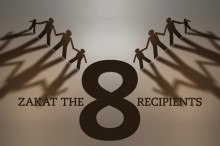
“Alms (Zakat) are for the poor and the needy, and those employed to administer the (funds); for those whose hearts have been (recently) reconciled (to Truth); for those in bondage and in debt; in the cause of Allah; and for the wayfarer: (thus is it) ordained by Allah, and Allah is full of knowledge and wisdom.” (Surah Al Tawbah 9:60)
One of the five pillars of Islam, Zakat is a purification for one’s wealth, freeing one from the love of possessions by encouraging humility and discipline. An essential principle of Islam is that everything belongs to Allah. We do not own our wealth, but have been entrusted with worldly possessions by Him.
Zakat means ‘purification’ and ‘growth’; possessions are purified by setting aside a portion for those in need, and like the pruning of plants, this cutting back encourages new growth.
The annual payment of zakat is different to any charitable gifts given out of kindness or generosity, otherwise known as sadaqah. Zakat is a mandatory religious obligation and forms the systematic giving of 2.5% of one’s net wealth each year, benefitting targeted recipients on a sustained basis.
From the Quranic verses ordaining zakat, eight classes of recipients have been identified by the scholars. As Ramadan approaches, we need to organise ourselves to reach out and distribute support to the eight beneficiaries of zakat.
- The Masakeen – translated as ‘the destitute’, these are people who do not have anything, and who are in need of asking others for food, clothing and shelter.

The Fuqaraa – translated as the ‘poor’ or ‘needy’.
- Fuqaraa – translated as the ‘poor’ or ‘needy’, these people have some money, but not sufficient for their everyday needs. The elderly are often amongst the ‘fuqaraa’. The Prophet Muhammad said “He is not one of us who does not show tenderness to the young and who does not show respect to the elder.” (At-Tirmidhi). It is a sad fact that the elderly tend to be neglected in today’s society. According to recent research, older people are among the most excluded and materially worse off.
- Amil’ Zakah – these are the alms collectors, people who the authority employs to collect zakat. The authority gives them a fee for their work, which includes collecting, recording, guarding, dividing and distributing zakat.
- Fi sabi ‘Lillah – this means ‘in the path of Allah’ and pertains to anyone struggling for a righteous cause, including expenditure towards the promotion of Islam and for all charitable purposes.
- Gharimun – these are the debtors, people burdened by debts because of personal needs or social necessity. These people should be given zakat if they do not have enough money beyond their basic needs to repay debts. Help should also provided to those who may have landed themselves in debt as a result of social obligations such as supporting an orphan or renovating a school.
- Ibn as’Sabil – traditionally, the wayfarers are travellers stranded in a foreign land in need of money. These people can receive zakat, if the purpose for travelling is lawful. Wayfarers can today be interpreted as refugees or displaced people.
- Riqab – the riqab are people in bondage or slavery. Zakat can be used to buy the freedom of such a person. Many people living in poor countries suffer from economic slavery at the hands of local landlords, rich industrialists, and multinational corporations that exploit natural and human resources.
- Mu’Allaf – translated as ‘those who have inclined towards Islam’. Zakat can be used to attract the hearts of those who have inclined towards Islam. It includes those who have just become Muslim, or those whose circumstances are so desperate they fear turning to crime if they are not helped.
ORIGINAL ARTICLE
Written by oneloveIslamPosted in Daily Islam,HadithTags: 1 LOVE ISLAM, akhira, allah, allahu akbar, arafah, ayaah, azaan, BEARD, believers, Bismillah, blessings, BROTHERHOOD, bukhari, call for prayer, Charity, creator, dawah, DAY OF JUDGEMENT, death, deeds, deen, dhikr, DU'A, forgivness, friday, guidance, hadith, hajj, HALAL, hearafter, heart, help, HOLY QURAN, I BEAR WITNESS, IQRA, islam, jannah, JESUS, jumma, kaaba, laillaha ilallah, last messenger, life, madinah, makkah, masjid, mecca, mohammed, muhammed, muslim, ONE ALLAH, ONE LOVE ISLAM, peace be upon him, prayer, prophet, QURAN, REMEMBERANCE, SALAH, SLAVE, Soul, sunnah, surah, Surah Kahf, tafseer, ummah, world, YA ALLAH, zakat, اللهAugust 1, 2012

Abu Barzah (May Allah be pleased with him) said:
The Messenger of Allah (Sallallahu Alaihi Wasallam) disliked going to bed before the `Isha’ (night) prayer and indulging in conversation after it.
[Al-Bukhari and Muslim]
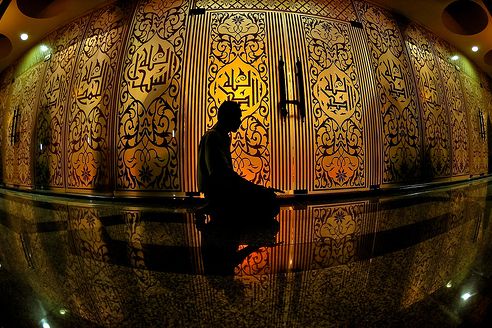
Written by oneloveIslamPosted in Daily Islam,HadithTags: 1 LOVE ISLAM, akhira, allah, allahu akbar, arafah, ayaah, azaan, BEARD, believers, Bismillah, blessings, BROTHERHOOD, bukhari, call for prayer, Charity, creator, dawah, DAY OF JUDGEMENT, death, deeds, deen, dhikr, DU'A, forgivness, friday, guidance, hadith, hajj, HALAL, hearafter, heart, help, HOLY QURAN, I BEAR WITNESS, IQRA, islam, jannah, JESUS, jumma, kaaba, laillaha ilallah, last messenger, life, madinah, makkah, masjid, mecca, mohammed, muhammed, muslim, ONE ALLAH, ONE LOVE ISLAM, peace be upon him, prayer, prophet, QURAN, REMEMBERANCE, SALAH, SLAVE, Soul, sunnah, surah, Surah Kahf, tafseer, ummah, world, YA ALLAH, zakat, اللهJuly 31, 2012
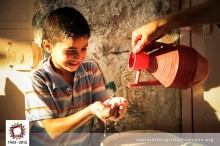
Narrated Humran:
I saw ‘Uthman bin ‘Affan asking (for a tumbler of water) to perform ablution (and when it was brought)
he poured water from it over his hands and washed them thrice and then put his right hand in the water container and rinsed his mouth and washed his nose by putting water in it and then blowing it out.
Then he washed his face thrice and (then) forearms up to the elbows thrice, then passed his wet hands over his head and then washed each foot thrice.
After that ‘Uthman said,
“I saw the Prophet performing ablution like this of mine, and he said, ‘If anyone performs ablution like that of mine and offers a two-rak’at prayer during which he does not think of anything else (not related to the present prayer) then his past sins will be forgiven. ‘
[Bukhari 0165]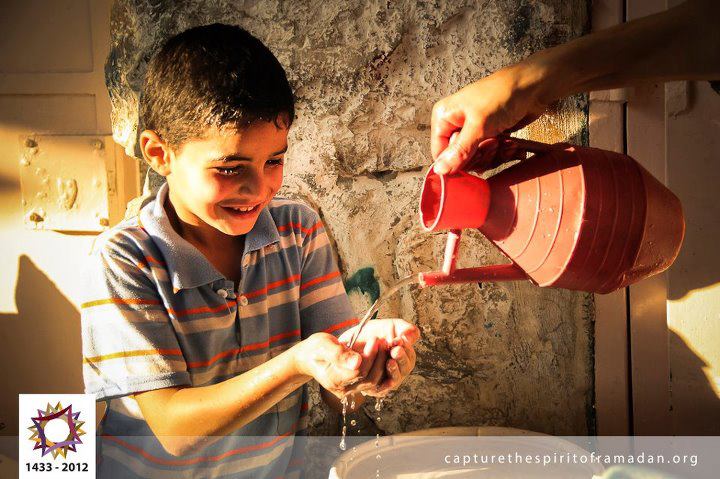
PHOTO CREDIT : capturethespiritoframadan.org
Written by oneloveIslamPosted in Daily Islam,QuranTags: 1 LOVE ISLAM, akhira, allah, allahu akbar, arafah, ayaah, azaan, BEARD, believers, Bismillah, blessings, BROTHERHOOD, bukhari, call for prayer, Charity, creator, dawah, DAY OF JUDGEMENT, death, deeds, deen, dhikr, DU'A, forgivness, friday, guidance, hadith, hajj, HALAL, hearafter, heart, help, HOLY QURAN, I BEAR WITNESS, IQRA, islam, jannah, JESUS, jumma, kaaba, laillaha ilallah, last messenger, life, madinah, makkah, masjid, mecca, mohammed, muhammed, muslim, ONE ALLAH, ONE LOVE ISLAM, peace be upon him, prayer, prophet, QURAN, REMEMBERANCE, SALAH, SLAVE, Soul, sunnah, surah, Surah Kahf, tafseer, ummah, world, YA ALLAH, zakat, اللهJuly 31, 2012
Do they not reflect on themselves? Allah created the heavens and the earth and whatever lies between them in Truth and for an appointed term. Yet many people deny that they will meet their Lord. [30:8]
Written by oneloveIslamPosted in Daily IslamTags: 1 LOVE ISLAM, akhira, allah, allahu akbar, arafah, ayaah, azaan, BEARD, believers, Bismillah, blessings, BROTHERHOOD, bukhari, call for prayer, Charity, creator, dawah, DAY OF JUDGEMENT, death, deeds, deen, dhikr, DU'A, forgivness, friday, guidance, hadith, hajj, HALAL, hearafter, heart, help, HOLY QURAN, I BEAR WITNESS, IQRA, islam, jannah, JESUS, jumma, kaaba, laillaha ilallah, last messenger, life, madinah, makkah, masjid, mecca, mohammed, muhammed, muslim, ONE ALLAH, ONE LOVE ISLAM, peace be upon him, prayer, prophet, QURAN, REMEMBERANCE, SALAH, SLAVE, Soul, sunnah, surah, Surah Kahf, tafseer, ummah, world, YA ALLAH, zakat, اللهJuly 30, 2012

Hasan al-Basri (rahimaullah) was an eminent scholar and pious individual of his time. He would rarely laugh due to his remembrance of death and the punishment of hell. One day he was going somewhere when he saw a young man indugled in laughter. Hasan al-Basri asked the youth, “Young man, have you already crossed the bridge of Sirath? Have you already found out whether you are going to paradise or hell?” The young man replied, “No.” Hasan al-Basri told him, “Then why are you laughing so much?” After that, no one saw this young man laughing again as he came to know the reality of this life.
Source: Story extracted from the book “Tambihul Ghafileen” by Shaikh Abul Laith Samarkandi.
Many hours or probably days have passed away from our lives in laughter and jokes. It is a sign that we have forgotten the life of the hereafter. The sahabah used to do good deeds all day but still cry during the night to Allah. On the other hand, we do sins all day and still have no concerns! It is permissible to laugh at amazing things and smile while being in company of others.
Written by oneloveIslamPosted in Daily IslamTags: 1 LOVE ISLAM, akhira, allah, allahu akbar, arafah, ayaah, azaan, BEARD, believers, Bismillah, blessings, BROTHERHOOD, bukhari, call for prayer, Charity, creator, dawah, DAY OF JUDGEMENT, death, deeds, deen, dhikr, DU'A, forgivness, friday, guidance, hadith, hajj, HALAL, hearafter, heart, help, HOLY QURAN, I BEAR WITNESS, IQRA, islam, jannah, JESUS, jumma, kaaba, laillaha ilallah, last messenger, life, madinah, makkah, masjid, mecca, mohammed, muhammed, muslim, ONE ALLAH, ONE LOVE ISLAM, peace be upon him, prayer, prophet, QURAN, REMEMBERANCE, SALAH, SLAVE, Soul, sunnah, surah, Surah Kahf, tafseer, ummah, world, YA ALLAH, zakat, اللهJuly 30, 2012
Written by oneloveIslamPosted in Daily IslamTags: 1 LOVE ISLAM, akhira, allah, allahu akbar, arafah, ayaah, azaan, BEARD, believers, Bismillah, blessings, BROTHERHOOD, bukhari, call for prayer, Charity, creator, dawah, DAY OF JUDGEMENT, death, deeds, deen, dhikr, DU'A, forgivness, friday, guidance, hadith, hajj, HALAL, hearafter, heart, help, HOLY QURAN, I BEAR WITNESS, IQRA, islam, jannah, JESUS, jumma, kaaba, laillaha ilallah, last messenger, life, madinah, makkah, masjid, mecca, mohammed, muhammed, muslim, ONE ALLAH, ONE LOVE ISLAM, peace be upon him, prayer, prophet, QURAN, REMEMBERANCE, SALAH, SLAVE, Soul, sunnah, surah, Surah Kahf, tafseer, ummah, world, YA ALLAH, zakat, اللهJuly 30, 2012
DUA AT THE TIME OF IFTAAR
A MOST BEAUTIFUL HADITH Once Moosa (Moses) (AS) asked Allah Taala: O Allah ! you have granted me the honor and privilege of talking to you directly, Have you given this privilege to any other person? Allah Taala replied, O Moosa during the last period I am going to send an ummat, who will be the Ummat of Mohammed with dry lips, parched tongues, emaciated body with eyes sunken deep into their sockets, with livers dry and stomachs suffering the pangs of hunger- will call out to me (in dua) they will be much much closer to me than you O Moosa! While you speak to me there are 70000 veils between you and me but at the time of iftaar there will not be a single veil between me and the fasting Ummati of Mohammed . Please confirm us the authenticity of this …its being spread on net.
Praise be to Allah.
This hadeeth is not part of the Prophet’s Sunnah, and it is not something that is known to the scholars and muhaddithoon in their books and Musnads. It is not narrated except in a few books whose authors filled them with fabricated reports, false reports, stories and myths, such as Nuzhat al-Majaalis wa Muntakhab al-Nafaa’is, by the historian and man of letters ‘Abd al-Rahmaan ibn ‘Abd al-Salaam al-Safoori (d. 894 AH) – pp. 182-183, Chapter on the virtue of Ramadaan and encouragement to do good deeds therein. It also appears in the tafseer Rooh al-Bayaan (8/112) by Ismaa’eel Haqqi al-Hanafi al-Khalooti (d. 1127 AH). They mentioned a hadeeth similar to that referred to by the questioner, in which it says: “Moosa (peace be upon him) said: ‘O Lord, You have honoured me by speaking to me directly. Will You give anyone else something like this?’ And Allaah revealed: ‘O Moosa, I have slaves whom I will bring forth at the end of time, and I will honour them with the month of Ramadaan, and I will closer to one of them than to you, because you have spoken to Me when there are seventy thousand veils between Me and you, but when the ummah of Muhammad (peace and blessings of Allah be upon him) fasts until their lips turn white and their faces turn yellow, I will lift the veil between Me and them at the time they break their fast. O Moosa, glad tidings to the one whose liver thirsts and whose stomach hungers in Ramadaan.”
Moreover, in the matn (text) of this hadeeth there is something which indicates that it is munkar (i.e., unsound), which is the words “I will be closer to one of them than you” – referring to Moosa (peace be upon him). It is well known in Muslim belief that the Messengers and Prophets are better than all other humans, and Moosa is one of the Messengers of strong will, so how can Allaah be closer to His slaves than to His Prophet Moosa (peace be upon him), of whom He said (interpretation of the meaning): “And We called him from the right side of the Mount, and made him draw near to Us for a talk with him” [Maryam 19:52]? And Ibn ‘Abbaas (may Allah be pleased with him) said: He drew so close that he heard the scratching of the Pen – i.e., writing the Tawraat (Torah). See: Tafseer al-Qur’aan il-‘Azeem by al-Haafiz Ibn Katheer (5/237).
Written by oneloveIslamPosted in Daily Islam,QuranTags: 1 LOVE ISLAM, akhira, allah, allahu akbar, arafah, ayaah, azaan, BEARD, believers, Bismillah, blessings, BROTHERHOOD, bukhari, call for prayer, Charity, creator, dawah, DAY OF JUDGEMENT, death, deeds, deen, dhikr, DU'A, forgivness, friday, guidance, hadith, hajj, HALAL, hearafter, heart, help, HOLY QURAN, I BEAR WITNESS, IQRA, islam, jannah, JESUS, jumma, kaaba, laillaha ilallah, last messenger, life, madinah, makkah, masjid, mecca, mohammed, muhammed, muslim, ONE ALLAH, ONE LOVE ISLAM, peace be upon him, prayer, prophet, QURAN, REMEMBERANCE, SALAH, SLAVE, Soul, sunnah, surah, Surah Kahf, tafseer, ummah, world, YA ALLAH, zakat, اللهJuly 30, 2012
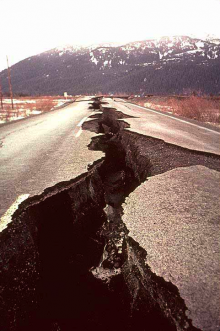
بسم الله الرحمن الرحيم
When the earth is shaken with its [final] earthquake
And the earth discharges its burdens
And man says, “What is [wrong] with it?” –
That Day, it will report its news
Because your Lord has commanded it.
That Day, the people will depart separated [into categories] to be shown [the result of] their deeds.
So whoever does an atom’s weight of good will see it,
And whoever does an atom’s weight of evil will see it.(99:1-8)
Written by oneloveIslamPosted in Daily Islam,HadithTags: 1 LOVE ISLAM, akhira, allah, allahu akbar, arafah, ayaah, azaan, BEARD, believers, Bismillah, blessings, BROTHERHOOD, bukhari, call for prayer, Charity, creator, dawah, DAY OF JUDGEMENT, death, deeds, deen, dhikr, DU'A, forgivness, friday, guidance, hadith, hajj, HALAL, hearafter, heart, help, HOLY QURAN, I BEAR WITNESS, IQRA, islam, jannah, JESUS, jumma, kaaba, laillaha ilallah, last messenger, life, madinah, makkah, masjid, mecca, mohammed, muhammed, muslim, ONE ALLAH, ONE LOVE ISLAM, peace be upon him, prayer, prophet, QURAN, REMEMBERANCE, SALAH, SLAVE, Soul, sunnah, surah, Surah Kahf, tafseer, ummah, world, YA ALLAH, zakat, اللهJuly 30, 2012
“Abdullah ibn Abbas (radi Allahu anhu) said that the Messenger of Allah (sal Allahu alaihi wa sallam) used to teach them this supplication in the same way that he used to teach them a Surah of the Quran. He would say: ‘O Allah, I seek refuge with You from the punishment of Jahannum and I seek refuge with You from the punishment of the grave. I seek refuge with You from the trial of the Masih ad-Dajjal and I seek refuge with You from the trials of life and death.’” [Sahih Muslim]
Firstly, this hadith tells us that the punishment of Jahannum is a reality, the punishment of the grave is a reality, the Fitnah of Dajjal (anti-Christ) is something very serious, and that there are trials in both life and death.
Secondly, this hadith also indicates the severity of various punishments and trials. The order in which the Messenger of Allah (sal Allahu alaihi wa sallam) sought refuge from them is indicative of their seriousness. The worst that could happen to a person is that they get thrown into Jahannum. The next worst thing that could happen to them is for them to be punished in their grave. Then comes the severity of the Fitnah of Dajjal, then other trials that afflict people at different times in their lives.
Even without revelation the Arabs knew that strange things happened in graves. If their horses got stomach ailments they would take them to graveyards. The horse would jump and twist so violently that its cramps would straighten away. The Prophet (sal Allahu alaihi wa sallam) told us that the punishment of the grave is heard by all creatures except men and Jinn, and that if we were cognizant of it we wouldn’t bury our dead.
The greatest trial of the living will be at the hands of Dajjal. Other than that there are numerous trials people go through as a result of which they are purified of their sins, as metal is purified from its ore through burning.
Trials also separate the wheat from the chaff. People will be rewarded according to the level of suffering they have patiently borne, and the trials they have dealt with keeping their Eeman intact.
We should try to keep the ingredients of this Dua in our prayers.

